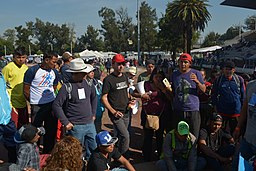COVID-19 Cases Surge in Europe
Lauren Diawatan
Staff Writer
On October 15, the head of the World Health Organization in Europe called for restrictive measures after a major increase of coronavirus cases throughout the continent, reports The Associated Press.
Dr. Hans Kluge explained that COVID-19 is now the fifth leading cause of death in Europe. The continent registered almost 700,000 cases as the highest weekly incidence of the coronavirus since the pandemic began, he clarified in a WHO press statement. He emphasized that while epidemiological models predict that relaxing policies could lead to daily mortality 4-5 times higher than April, they also suggest that restrictions on public and private social gatherings could save nearly 281,000 across 53 European WHO member states by February 2021.
The Associated Press writes that the European Commission released its latest vaccination strategy on Oct. 15, calling for its member countries to prepare to immunize its citizens against the coronavirus. The European Union has made bilateral deals with multiple pharmaceutical companies, stating that all countries should have access to the 1 billion doses of experimental shots secured.
Since, UN Secretary-General Antonio Guterres released a United Nations press statement condemning the misuse of COVID-19 resources. In his UN press statement, Secretary-General Guterres declared that “corruption is criminal… the ultimate betrayal of public trust,” especially as seen during the COVID-19 pandemic. He stated that the virus provided opportunities for companies to take advantage of weak oversight, with governments failing to verify suppliers or determine fair prices. The Secretary-General also warned of merchants selling poorly manufactured tests and counterfeit medicines, and of collusion leading to “outrageous costs of much-needed goods, skewing the market and denying many people life-saving treatment.”
The Secretary-General urged state governments to employ the tools of the United Nations Convention against Corruption. According to the United Nations Office on Drugs and Crime, the Convention is “the only legally binding universal anti-corruption instrument.” Naming five key areas – preventative measures, criminalization and law enforcement, international cooperation, asset recovery, and technical assistance and information change – the Convention serves as an extensive approach towards global corruption.
The New York Times reports that new restrictions were accepted to avoid the harder alternative: new nationwide lockdowns. Governments are attempting to balance between containing the virus and maintaining the tolerance of the public. In multiple European countries, the abrupt end of lockdowns brought a sense of normalcy to the public. Germany and many of its neighbors managed the first wave with minimal fatalities. Spain and Italy reopened to travelers in July and August.
The Associated Press reports that Madrid declared a state of emergency on Oct. 9. The state of emergency represented the tension between local Madrid authorities and the national government; the declaration restored travel restrictions from the national government that were originally struck down by a Madrid court ruling.
According to The New York Times, President Emmanuel Macron of France imposed a 9 p.m. to 6 a.m. curfew in nine metropolitan areas, including Paris, on Oct. 14 went into effect that weekend. France had 120,000 new cases the previous week. In Amsterdam, face masks were made mandatory in indoor public spaces, while bars and clubs were shut down in Prague and Liverpool.
Germany had 5,132 new infections on Oct. 13, increasing by 2,639 from the previous week. Chancellor Angela Merkel of Germany remarked that “I am watching with great concern the renewed increase in infection numbers in almost every part of Europe. We mustn’t throw away what we achieved via restrictions over the past few months.”



